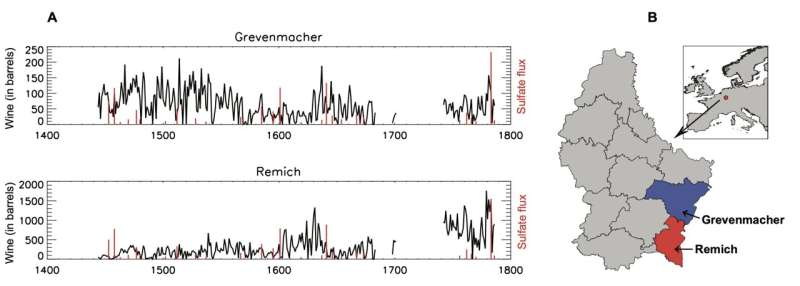July 31, 2024 feature
This article has been reviewed according to Science X's editorial process and policies. Editors have highlighted the following attributes while ensuring the content's credibility:
fact-checked
peer-reviewed publication
trusted source
proofread
Volcanoes and wine: Eruptions reduced historical Moselle Valley vineyard production

Climate has an important role to play in viticulture (wine production) due to the impacts on grape harvest from variability in parameters such as temperature, precipitation and aridity. Warmer and drier climates with long growing seasons benefit grapevine growth, although beyond a tipping point, it can be damaging in climates akin to the Mediterranean. The Moselle Valley, spanning north-eastern France, south-western Germany, and eastern Luxembourg, has historically been and continues to be a major source of wine production in climatically-sensitive central and southern Europe.
New research, published in Climate of the Past, has investigated the impact volcanic eruptions have had on viticulture due to climate cooling. Such colder temperatures result from the aerosols released in the eruption reflecting incoming solar radiation, as well as acting as condensation nuclei for cloud formation to further this process, therefore reducing the temperature of Earth's surface and triggering a negative feedback loop.
Professor Fredrik Charpentier Ljungqvist, a historian and paleoclimatologist at Stockholm University, and colleagues focused on quantitative historical records of wine production in the Luxembourg portion of the Moselle Valley covering 1444–1786 and compared this to proxies of climate change during the period.
The information on viticulture was derived from official records of tax issued on the number of barrels of wine produced, volcanic eruptions from stratospheric sulfur data obtained from Greenland and Antarctic ice cores, and climate reconstructions from dendrochronology. The latter is the study of the annual concentric growth rings of woody plants that can both age them and offer insights into temperature and precipitation through variations in ring width. As such, wider rings occur during years of cooler and wetter conditions, with the opposite true during droughts.
Significantly, the research team identified a clear pattern of reduced wine production in the years immediately following major volcanic eruptions, compared to elevated production from better harvests in warmer and drier years. Professor Ljungqvist and colleagues discovered a link between zero tax on wine production (and therefore inferred reduced harvest) in the first year after five major volcanic events in 1481, 1601, 1674, 1767 and 1784. Additionally, as eruption intensity increased, they found a 3–4 year lag in the response of wine production, highlighting the longer-term consequences of Earth's natural phenomena.
More information: Fredrik Charpentier Ljungqvist et al, Strong volcanic-induced climatic shocks on historical Moselle wine production, Climate of the Past (2024). DOI: 10.5194/cp-2024-41
Journal information: Climate of the Past
© 2024 Science X Network




















